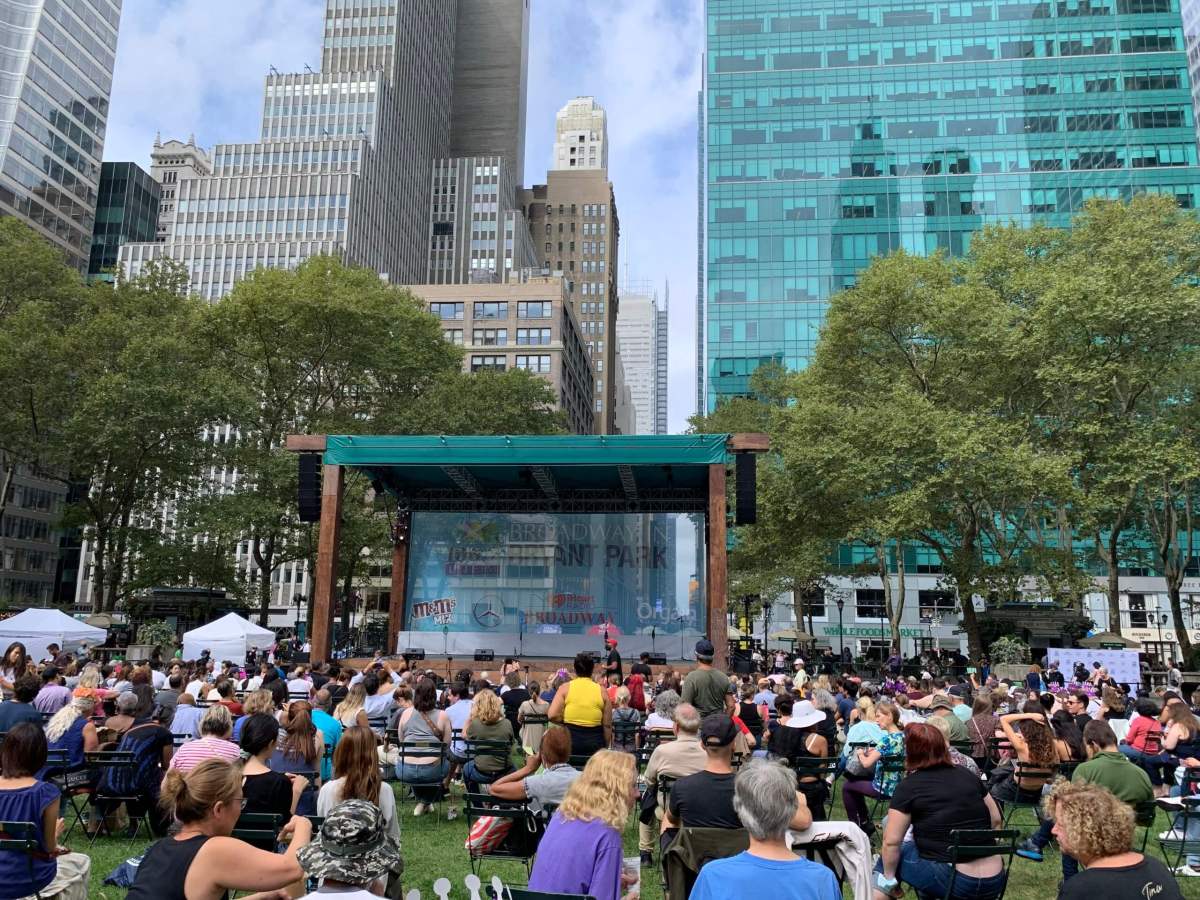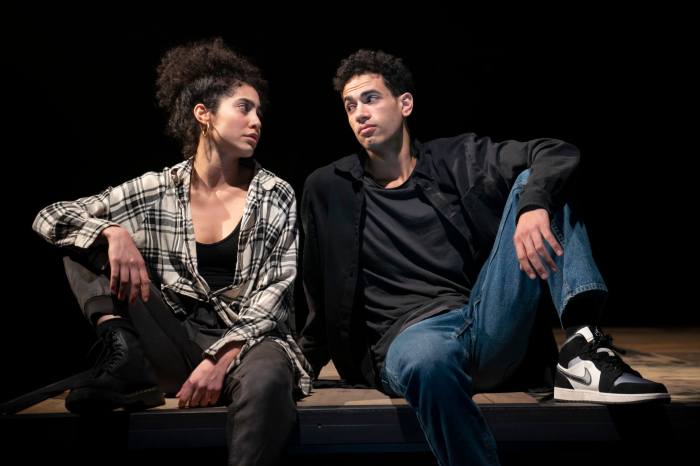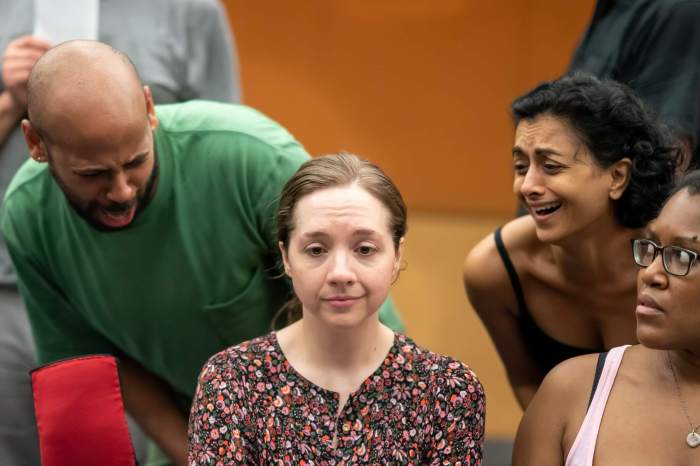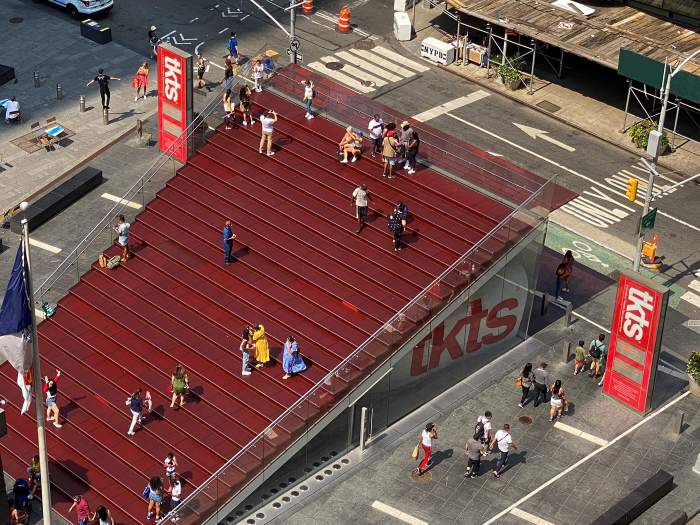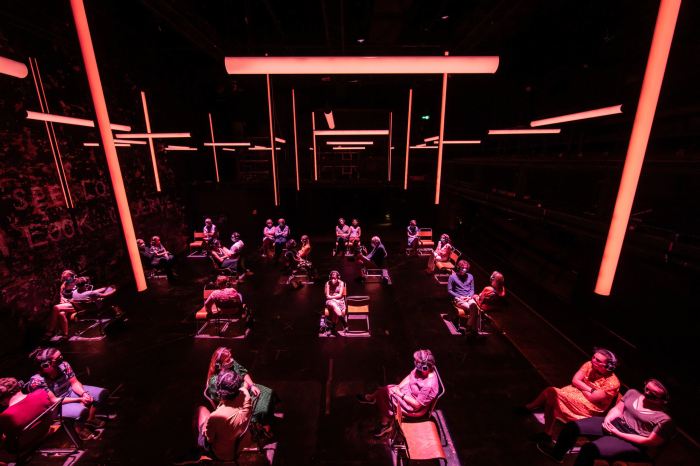Chloe Bergeron, a New York artist and theatre lover said her roommate, Matt Paris, who was in a virtual production of “Something Rotten,” spent months practicing in front of the DIY production set-up.
A green screen takes up most of the space in his tiny New York apartment bedroom. A lamp is propped up on the bed along with a chair that holds a tripod and an iPhone for recording.
While the return of Broadway may mean the end of home-made productions for some actors, the last curtain call for many smaller theater companies throughout the city was over a year ago.
“It’s great that Broadway is coming back,” said Jonathan Fielding, a New York-based actor. “It’s wonderful that they are leading the way. But once the party’s over, don’t forget the smaller companies who are also trying to reopen, and support them just as much and celebrate them just as much when they’re able to figure out how to operate in a safe way while COVID is still around.”
But the return of Broadway is a sign that all live theater will hopefully return soon, said Kate Cortesi, a New York-based playwright.
“I think most of us were using broadway announcements as a temperature check, and on a base level, broadway coming back signaled a return of live theater,” Cortesi said.
Broadway is requiring masks to be worn during shows and for all guests to be fully vaccinated.
“If the protocols work for the big shows, I hope they will also work for smaller shows,” said Marianne Sabona, who attended Broadway in Bryant Park on Sept. 23.
Small theaters, big difference
Smaller theatre companies are vital to New York’s live performance environment.
“The majority of Broadway people have worked in smaller companies first, and without them, there is no Broadway,” said Ben Thompson, a Broadway actor who started out performing with smaller companies. “And a lot of your Broadway stars wouldn’t be Broadway stars without those smaller companies.”
Thompson said some of the best work is done at these smaller companies.
“People come to New York and they’re like, ‘I want to see a Broadway show’ which yes, come see a Broadway show, but go support those small theaters because that’s where some really cool work happens and some unbelievable actors are working,” Thompson said.
Deanna Foote was a frequent patron of smaller theaters pre-pandemic. She said she is saddened that many smaller theaters have yet to open their doors.
Some avid theater goers said they miss the intimate setting that only small theaters can offer.
“It will be extra exciting when those (smaller theater) come back and we can support new and independent thought because they work to shift the status quo a bit more than Broadway can, and with the additional intimate space these are my favorite shows,” Bergeron said.
Bergeron said she misses the interactive element of smaller shows- being able to sit at tables in the audience and meet the characters.
Making a comeback
Cortesi is a part of a smaller, New York based theater company that is making its debut soon.
The Pool is a pop-up theatre company that puts playwrights in charge of their entire production. The Pool will produce three new plays in rep in the fall of 2021 at the New Ohio Theatre.
For Cortesi, this production has been a long time coming.
“We chose to become play producers at the moment of the global pandemic,” Cortesi said. “It tested our will and our faith. And now we are back.”
The company starts rehearsals on Oct. 4, and “Superstitions” by Emily Zemba, will premiere Nov. 1.
“Our drive and hunger to make it work is stronger than ever because we experienced a year and a half without this thing that we love, and why we need the theatre, why we need to create work as theatre artists- it feels more urgent than ever,” Cortesi said.
Fielding is acting in The Pool’s “The Ding Dongs,” by Brenda Withers. This will be his first show back in New York since the pandemic began.
The Pool’s pop-up model makes it easier to set up and shut it down if need be.
“We feel small and agile,” Cortesi said. “We can easily stop and easily pick back up. We’re feeling lucky to have the agility that smaller operations can have.”
But other small theater companies are still struggling to reopen, especially as some theatre spaces remain closed, Fielding said.
“There’s definitely still a lot of zoom going on, a lot of live streaming performances,” Fielding said.
What this means for small company actors
When the pandemic forced the theatre industry to go remote, actors were forced to become producers, editors, lighting directors, sound engineers and their own talent coaches. Fielding set up his own at-home studio with a tripod, ring light and backdrop just to have a chance at competing.
“All of the auditions turned into at-home auditions where you put yourself on tape,” Fielding said.
Throughout the pandemic, Fielding directed an audio play via zoom, came up with his own theatre projects to pursue when things reopened, was a dialect coach for a play and was cast in a movie in which he quarantined for a week before filming and then agreed to be tested every couple of days, wear a mask and answer health questions.
“These theatre companies that have put together Zoom projects and creative projects were a real help because it gave me an outlet to work,” Fielding said.
But Fielding still had to cut back on spending by cooking at home and not buying anything that wasn’t necessary.
Even though remote production gave actors work, the experience for audiences was not the same.
“It takes away the theater, it’s not theater it’s film,” Bergeron said. “And the actors don’t get to create the bind and feel the impact they’re making through performance. So much is lost.”
Other actors were unable to make ends meet solely with their acting jobs.
Zach Lusk, a New York-based actor, was already working in coffee as a “survival job” before the pandemic, he said. For Lusk, the pandemic “killed a lot of momentum.”
Many of his projects were put on hold and fully staged productions turned into zoom readings.
He has decided to step away from acting for the time being. The theatre industry is already filled with so much uncertainty, Lusk said. And the pandemic only compounded that. But he still thinks the return of live theatre is vital.
The importance of theatre, big or small
Theatre forces people to sit back and watch, and listen, and observe and then spend some time reflecting afterwards, Lusk said. This is so important in a society filled with division, he said. Theatre prompts people to engage in meaningful discussion.
Thompson said the opening of Broadway is a beautiful thing because it allows people to come together in a common space and have a common experience that hopefully allows the audience to get away from the real world for a little bit. But, Broadway can’t go back to the way it was, he said.
“On one hand Broadway reopening is unbelievably hopeful, and it’s wonderful for New York and wonderful for the art form, and it’s wonderful for the kids who are going to go see their first Broadway show,” Thompson said. “But, on the other hand, there’s still a lot of work we have to do in terms of raising the level of equity in the community.”
While Broadway works to include more diversity as they reopen, their debut has been met with excitement and appreciation from audiences.
“It’s easy to go to a show and sit back and say, ‘Okay, impress me. What do you got?’ But I think after 18 months of not being able to do that, it has made us a little bit more appreciative and open to the gift of live performance and less cynical,” Cortesi said.
Fielding said he’s heard audiences are taking several standing ovations during shows, and he thinks the support and excitement level from audiences will be the same, whether it’s a big or small theater.
Thompson said the artist’s life of “feast and famine” is really hard. But showing your work to an audience makes it worthwhile.
“Now that Broadway has reopened, I can’t wait to see what it’s like to be in a theater with people again,” Thompson said.
The return of live theatre is exciting, but some are apprehensive.
“I didn’t used to say, ‘Will I be safe if I go to the theatre?’ Know you have to think about what’s worth it,” Cortesi said. Adding, “We’re going to tell a story that good, that vital, that funny- whatever it is we’re trying to do- let’s do it at a level so we all left our house and it’s worthy of that risk.”
Cortesi went to see Bruce Springsteen on Broadway in June and said she felt nervous about being back inside with a lot of people, but once she was there, she said it was a gift to experience live theatre again.
“I felt so aware of what a gift it is to be in a live audience and that made it really special,” Cortesi said.
Bergeron said seeing people perform in person gives her “goosebumps” because of how long it has been.
During Broadway in Bryant Park on Thursday, host Rob McClure, who stars in Broadway’s “Mrs. Doubtfire,” said, through tears, that he can’t explain how much it means to him to see a live performance again.
“I’m a wreck,” he said.



